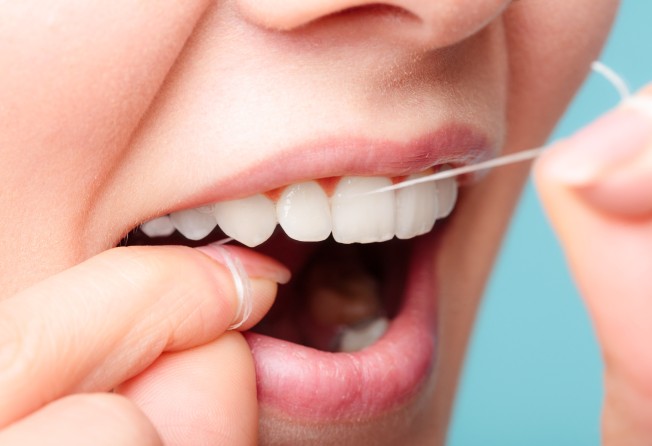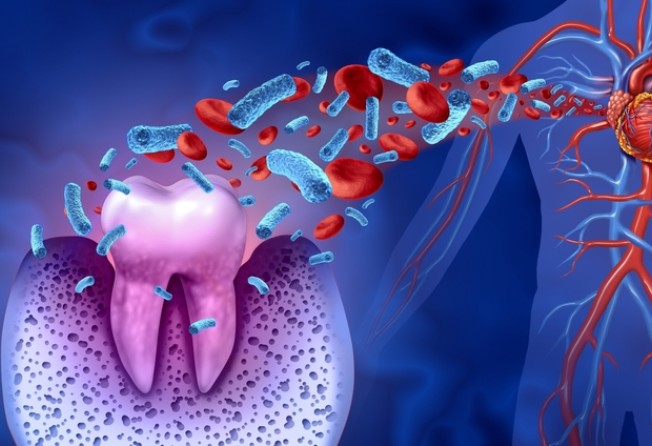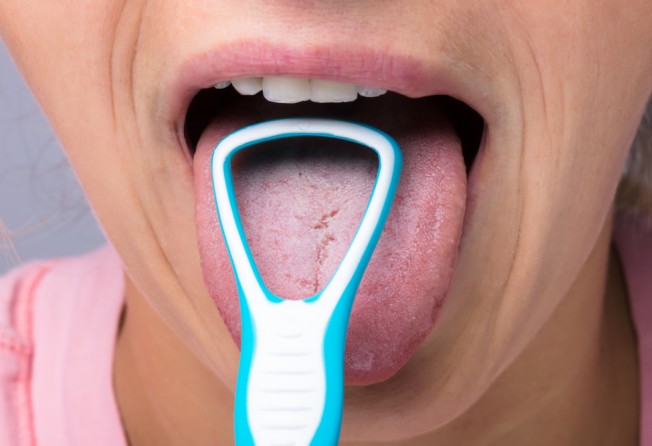
Why good dental hygiene is essential to reduce inflammation and slow the onset of chronic diseases and ‘inflammaging’
- Bacterial overgrowth in the mouth is closely connected to chronic inflammation, a precursor to many major diseases that triggers ‘inflammaging’
- Good dental habits include tongue scraping, using an antimicrobial mouthwash, drinking green and black teas, and eating fibre-rich foods

When we think about ways to prevent heart disease, looking after our teeth and gums is probably not something that comes to mind. But in recent years, studies have established a closer link between poor oral hygiene and inflammation – a known trigger for many serious illnesses, including heart disease.
Studies that examined the association between oral health and heart health found that people with gum disease are at an increased risk of up to 25 per cent for heart disease, says Dr Derek Baram, a specialist in orthodontics at Central Smile in Hong Kong.
The American Dental Association (ADA) suggests that oral health is a strong predictor of coronary heart disease, and is a better predictor of it than other markers such as high levels of the clotting factor fibrinogen, low levels of high-density lipoprotein (HDL) cholesterol and high triglycerides.
Besides heart disease, research shows that gum – or periodontal – disease can predispose us to illnesses that include colorectal cancer, respiratory tract infection, gastrointestinal diseases, diabetes and insulin resistance, and even Alzheimer’s disease.

But how exactly does poor oral hygiene cause or increase inflammation in the body?
Our mouth is home to billions of bacteria – this community of microorganisms is called the oral microbiome. Graeme Bradshaw, a naturopath and the founding director of the Integrated Medicine Institute in Hong Kong points to the three main organisms found in the mouth.
Porphyromonas gingivalis – which infects gums and bone, but can cause accumulation of deposits in the coronary arteries around the heart – was found to be implicated in the development of rheumatoid arthritis, and was identified in the brain of Alzheimer’s disease patients.
Two others, Escherichia coli [E coli for short] and Pseudomonas aeruginosa, can also thrive in the gut.
Problems arise when this microbial ecosystem becomes overgrown or unbalanced. The bacteria produce endotoxins, potent toxins that can enter the bloodstream through the gums and the thin membranes in the mouth.
As they spread through the circulatory system and to the organs and gut, these endotoxins generate cytokines, chemical messengers that in large amounts can create a “cytokine storm”.
Cytokine storms trigger an inflammatory response in the body, causing damage to our blood vessels and organs.
Even if the inflammation is mild, if it is chronic it can induce disease in the liver, pancreas, gut, heart and other organs, leading to fatty liver, metabolic syndrome – a combination of diabetes, high blood pressure and obesity – gut problems and cardiovascular disease, for instance.
Bradshaw says the term for this is “inflammaging” – a combination of the words inflammation and ageing. Inflammaging is chronic, low-grade inflammation that develops as we age.

“This process of excessive endotoxin production, which hastens inflammaging, is common to about half of adults,” he adds.
“The endotoxins come from bacterial overgrowth in either the mouth or the gut. In the gut this is commonly called small intestinal bacterial overgrowth, or SIBO. SIBO starts in the mouth, since the oral bacteria are swallowed and can become overgrowth in the gut.”
Keeping our teeth and gums healthy is vital, not only to prevent dental issues like cavities and to maintain an attractive smile, but also to minimise our risk of developing serious illnesses when we’re older.
“It’s not just about the quantity of bacteria but the quality as well,” Baram points out. “There are specific types of bacteria that promote dental cavities and there are other microorganisms that live within the gum tissue that promote gum disease.
“We should aim to minimise these bad bacteria while promoting the growth of healthy bacteria in the mouth.”
There are several ways to keep your oral microbiome healthy and prevent inflammatory conditions that may affect the tissues surrounding the teeth, such as gingivitis (early-stage gum disease) and periodontitis (a more severe and serious stage of gum disease):
1. Optimise your oral hygiene routine
Baram recommends brushing your teeth twice a day for two minutes each time, using a fluoride toothpaste and a soft-bristled toothbrush.
“Position your toothbrush at a 45-degree angle on the gum line so it’s touching your gums and teeth. Brush in a circular motion using gentle pressure. The idea is to disrupt and remove the bacteria.
“Many people think that the harder you brush the cleaner your teeth will be, but hard brushing may cause your gums to recede, and this can lead to tooth sensitivity.”
Baram also suggests flossing once a day. “Your toothbrush can’t reach in between your teeth. Dental floss, on the other hand, can get into these tight spots as well as underneath the gums, where a lot of bacteria live.
“These bacteria are responsible for gingival inflammation, a sign of gingivitis, that results in bleeding gums.”

2. Use an antimicrobial mouthwash
This can reduce bacteria and stop bacterial activity in the mouth, says Baram. Because it’s a liquid, antimicrobial mouthwash can help carry antimicrobial agents to all areas of the oral cavity.
3. Clean your tongue
Scraping or brushing your tongue removes the bacteria and dead cells that are on the surface. This not only helps counter bad breath, but also reduces the overall number of bad bacteria in the mouth. Baram suggests scraping your tongue once a day.

4. Choose the right foods and drinks
Limit your intake of sugary foods, as the sugar tends to stick to the teeth. Bacteria thrive on these sugars, producing acids that may cause cavities.
“The American Dental Association recommends fibrous foods like carrots, celery and apples,” Baram says. “Not only are these good for gut health; they also get your saliva flowing.”
Saliva keeps our oral cavity healthy by helping to maintain a neutral pH level. Another way to stimulate saliva production is by chewing sugar-free gum.
You should also load up on calcium-rich leafy greens like kale and spinach, which Baram says will help to strengthen your tooth enamel.
Green and black teas contain polyphenols, which may prevent bacteria from sticking to our teeth and gums.

5. Test your oral microbiome
Bradshaw says that you can assess the health of your oral microbiome using a polymerase chain reaction, or PCR, test. (They aren’t just for Covid-19.)
If there’s an overgrowth of potentially pathogenic bacteria, you can take steps to minimise their spread to reduce your risk of age-related complications.
“People with high triglycerides and low beneficial HDL cholesterol, fatty liver, metabolic syndrome (prediabetes), high blood pressure, arteriosclerosis, kidney disease or periodontitis should all take note: the endotoxins in your mouth or gut are at least part of the cause of these degenerative illnesses,” he stresses.